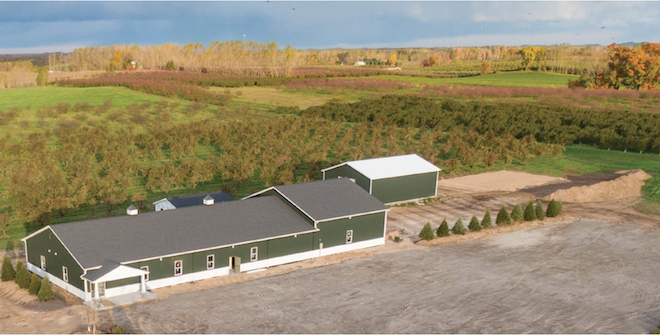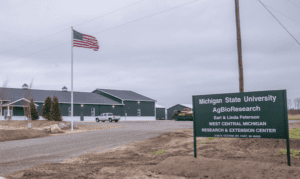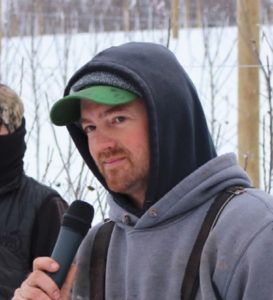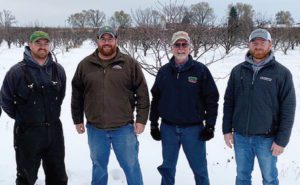

Feb 1, 2021Growers’ group builds own research facility
Most asparagus growers in west-central Michigan also grow tree fruit, and it is no coincidence that the new horticultural research station built in that region is located near the Michigan Asparagus Research Farm.
The Earl & Linda Peterson West Central Michigan Research & Extension Center, a $1.5 million project of the nonprofit West Central Michigan Horticultural Research Inc., in January was nearing completion of the buildings and grounds, and getting up and running.
The next phase of the project – building the farm – is beginning, with a deer fence being constructed during the 2020-2021 winter and a new planting of apple trees being planned for 2022.


The facility, part of Michigan State University (MSU) AgBioResearch, is located at 5185 N. Oceana Drive in Hart, Michigan. The station is located on 68 acres adjoining the north side of the Michigan Asparagus Research Farm in Oceana County, where the group would also serve growers in Mason and Newaygo counties. The group is inking a deal with the Michigan Asparagus Advisory board and the two groups will share equipment and staff to operate the two efforts.
The collaboration between asparagus and tree fruit interests in the region is a natural fit for local growers, most of whom grow both crops.
“We’re basically all the same people,” said the group’s president, Andy Riley, a grower at Riley Orchards in Mears.
While the project is for and largely led by growers, it’s become something of a community effort with others in the greater produce industry, local community and regional apple business taking an interest in the project’s success. The Community Foundation of Oceana County, the Fremont Foundation and the Oceana County Road Commission have all donated to the effort. There are too many donors to name, but they include Greenstone Farm Credit, the Michigan Apple Committee, the Michigan Tree Fruit Commission, the Michigan State Horticultural Society and Materne North America Corp., a local company that specializes in squeezable food pouches, called GoGo squeeZ.


Riley credited board member Richard Raffaelli, the chief operating officer for Shelby, Michigan’s Peterson Farms for being the driving force behind the project.
“I would like to thank him for his role and his leadership, and his ability to bring all industry groups together so we’re able to accomplish this together,” Riley said.
Besides the main facility, there will be an equipment barn, antique tractor pavilion, pesticide building and a bunkhouse. Trails, gardens, a gazebo and an outdoor meeting space will lend the location to school visits and other community events and trade meetings. The indoor meeting area seats 220.
“We are going to rent out the facility to receive incremental revenue,” Raffaelli said. “We need this venture to be sustainable.”
Fundraising also continues. Operating costs are budgeted at about $35,000 per year, he said. The project is about $160,000 short of finishing an irrigation system.
The facility will have three part-time staff: a farm manager, assistant farm manager and MSU faculty station coordinator, who have yet to be named publicly. The area’s Michigan State Extension educator and researcher, David Jones, left the area about a year ago to live closer to family, Riley said, and the growers are continuing to negotiate with MSU to receive a replacement for Jones.
While there are several other MSU research stations in the state, growers in the three-county region say growing conditions are much different than the other regions. The soils are sandier than the Fruit Ridge area in Sparta, Michigan, and, of course, the area is at a higher latitude than fruit and vegetable growers in the southeast part of the state. The sandier soils are good for growing asparagus and have even been found effective for avoiding bitter pit in Honeycrisp, Riley has said.


Variety and rootstock trials are an objective for horticultural research, and the Midwest Apple Improvement Association – developers of the Evercrisp and Ludacrisp apples – is among the donors. Riley said that Michigan doesn’t have an apple breeding program, and cherry breeder Amy Iezzoni, an MSU horticulturalist since 1981, plans to retire soon. A few studies were conducted at the site in the last year on existing stands of pears and cherries, and peaches harvested on the acreage were sold, Raffaelli said.
The Michigan Asparagus Research Farm for years has conducted trials of varieties and disease, weed and pest research. Research findings are published and presented each year at Asparagus Day, a trade event held in Hart in mid-March.
“The success of asparagus in our area is just as important as the apples aspect,” Riley said.
— Stephen Kloosterman, associate editor; Photo at top: The research station’s 68 acres adjoins the Michigan Asparagus Research Farm. Courtesy of Peterson Farms.














